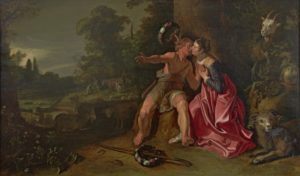Over the past few years, the E-ABIDA panel at the January meeting of the British Society for Eighteenth-Century Studies has become an annual event. BSECS, regularly hosted by St Hugh’s College Oxford, provides an unparalleled opportunity for members of the Behn team to share their latest findings from across the wide range of research represented by the project. Participants in recent years have included Ros Ballaster, Robert D. Hume and Helen Wilcox, as well as the project’s PI, Elaine Hobby.
This year’s panel, in keeping with the conference theme of ‘Islands and Isolation’, considered issues of separation and connectedness in Behn’s work. Alan Hogarth, representing the digital humanities side of the project, reported on his joint research with Mel Evans in ‘Isolating the Idiolect: Forgery and Style in Behn’s Spying Letters’. Behn’s 1660s letters from the Low Countries, where she had been despatched as a spy for the crown, have long been the subject of great fascination for historians and literary scholars alike. The authenticity of a portion of these letters – the embedded missives from William Scot – has recently been called into question by important new research by Nadine Akkerman, who argues that Scot’s letters may in fact have been creative forgeries by Behn herself. Alan’s paper discussed what digital humanities methods can do to complement traditional literary approaches to authorial attribution, and reported on the results of computational analyses carried out by himself and Mel to test the authorship of the Scot letters. A jointly authored publication is to follow – watch this space for further news!
In the second paper of the panel, ‘Imitation and the Isolated Woman: Aphra Behn’s “Oenone to Paris” in Restoration Literary Culture’, Gillian Wright moved from espionage to poetry, addressing what is perhaps the pivotal poetic publication in Behn’s career. Published in 1680, Behn’s ‘Oenone to Paris’, a rendering of one of Ovid’s Heroides, involved collaboration with two of the leading figures in Restoration literary London, the poet and dramatist John Dryden, and the up-and-coming young bookseller Jacob Tonson.

Pieter Lastman, 1610. Paris and Oenone. <https://high.org/collections/paris-and-oenone/>
Through its inclusion in this prestigious volume, ‘Oenone to Paris’ put Behn on the map as a literary translator – or rather (not quite the same thing) as a literary imitator: the resonances of Dryden’s designation of her poem as ‘in Mr. Cowleys way of Imitation only’ are still debated (and were discussed in at least two other papers elsewhere in the conference). Gillian’s paper discussed Behn’s use (and non-use) of previous translations of ‘Oenone to Paris’ by George Turberville, Wye Saltonstall and John Sherburne in 1639, and briefly considered how her practice in this early poem compares with her methods in later imitative works such as Cowley’s sixth book of plants. A longer version of her paper is to be published in Early Modern Women’s Complaint: Gender, Form, and Politics, ed. Sarah C.E. Ross and Rosalind Smith.
The final paper in the panel, Claire Bowditch’s ‘Readers’ Responses and Press Variants in Aphra Behn’s Works’, reported on the findings of over three years of research in numerous scholarly libraries in the United Kingdom, Ireland, and the United States. With Elaine Hobby, Claire has been responsible for collating hundreds of early copies of Behn’s works for The Cambridge Edition of the Works of Aphra Behn, and has discovered some intriguing evidence of both in-press revisions to volumes issued during Behn’s lifetime and also early readers’ responses to her writings. Was Behn herself connected with these in-press revisions, and which of her works proved most appealing – or most provocative – for early readers? Again, a publication is in progress – watch this space.
The panel was ably chaired by Robert D. Hume (a member of the Project Management and Editorial Boards for the Cambridge Behn), and attracted an excellent (and pleasingly appreciative) audience. E-ABIDA will return to BSECS in 2020.
Recent Comments